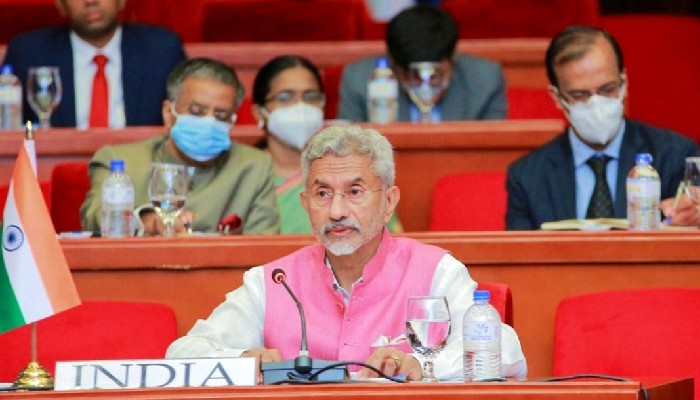The maintenance of international peace and security can no longer be taken for granted, he said
Noting that the international system is going through a very challenging phase, External Affairs Minister S Jaishankar on Tuesday said that there is a need to broaden and deepen cooperation under Bay of Bengal Initiative for Multi-Sectoral Technical and Economic Cooperation (BIMSTEC).
Jaishankar in his statement at the 18th BIMSTEC Ministerial Meeting in Colombo said, “The international system is going through a very challenging phase, perhaps one of the most difficult in recent memory. The challenges of Covid -19 pandemic have not yet fully abated. But recent developments in Ukraine have added to international disquiet.
“We have all underscored that the maintenance of international peace and security, and even stability can no longer be taken for granted. We must recognise that we face headwinds - both from the global economy and in some cases from within our own domestic economies,” the Minister argued.
“Under these circumstances, as we shore up our domestic capacities, we also need to broaden and deepen cooperation under BIMSTEC,” he added.
“We need more working together in many more areas; we need more effective and fast paced cooperation. We need to intensify and build on what we have achieved in the last 25 years,” Jaishankar stated.
Noting that on Wednesday, BIMSTEC leaders will adopt the BIMSTEC Charter, he said, this is a land mark achievement in the effort to develop the institutional architecture for the grouping. “But we must not rest on this achievement and instead move on to ‘next steps’ that can be taken to further strengthen BIMSTEC,” the EAM added.
“I am confident that we will identify priority institution building tasks & areas of cooperation, and task our senior officials to work with the Secretary General for their realization,” he hoped.
Calling for accelerating efforts to boost intra BIMSTEC trade and economic ties, Jaishankar said, the development of a network of regional supply and value chains will reduce our vulnerability to external shocks and give our economies greater resilience and transparency.
“This requires us to accelerate cooperation that has been under discussion for long. Simultaneously we must also work on a more ambitious Trade Facilitation agenda,” he informed.
According to the Minister, BIMSTEC Leaders will also adopt a BIMSTEC Master Plan for Transport Connectivity in Wednesday.
“This detailed document provides a framework which can help us better align our national transportation and connectivity networks. It must be fully backed by energetic business collaboration,” he pointed out.
“We must also accelerate efforts on ongoing initiatives such as the establishment of a coastal shipping eco system, of port facilities, of ferry services in the Bay of Bengal, as also power grid interconnectivity and a regional motor vehicles agreement,” Jaishankar further stated.
Noting that we live in one of the most disaster prone regions of the world, he said activities that enhance our disaster management capacities, merit special attention.
“In this connection we are taking steps to strengthen the functioning of the BIMSTEC Centre for Weather and Climate that is located in India which has been serving this region. We urge all BIMSTEC partners to consider joining the Coalition for Disaster Resilient Infrastructure (CDRI),” Jaishankar said.
Stating that much of what we can achieve in our national development efforts is, of course, predicated on a peaceful, secure and stable environment, he said we cannot ignore the challenges that terrorism & violent extremism, as also transnational crime and narco-trafficking or indeed new challenges such as cyber-attacks, pose to all of us.
“All of these affect our economic development efforts. We need to put in place the remaining elements of the legal architecture that will enable our law enforcement agencies to collaborate more closely and more effectively,” EAM Jaishankar said.
“The Bay of Bengal achieving SDG 14 targets and ensuring a ‘good order at sea’ in keeping with international maritime law, particularly UNCLOS is a priority,” he maintained.
“A practical way to proceed is to have discussions using existing dialogue mechanisms, even while we put in place a plan of action in the maritime domain which is consistent with our national priorities,” the Minister suggested.
“The science of oceans is not easy. To get matters moving, India is keen to develop platforms and initiatives that can enhance collaboration between our scientist and experts in the maritime domain,” he observed.
Welcoming Don Pramudwinai, Deputy Prime Minister and Foreign Minister of Thailand as the incoming BIMSTEC Chair, Jaishankar said, "India looks forward to working with you and your country, during the course of your Chairmanship to take the BIMSTEC agenda forward".
“And we do so recognising that BIMSTEC will now get a charter and an institutional framework that has been strengthened in its 25 years of existence. Its areas of cooperation have been rationalised,” he added.
“We will utilise these developments to further build the organisation to meet the aspirations of our peoples and their desire for a better life,” the EAM assured.
He underlined that with respect to BIMSTEC, India will bring to bear all relevant policies and approaches – one, as Neighbourhood First, give it the utmost priority; two, in consonance with the SAGAR outlook, realize its full maritime potential; and three, as a first responder, be it on HADR situations, Covid or economic recovery, be there at critical times for all of us.
 Contact Us
Contact Us  Subscribe Us
Subscribe Us









 Contact Us
Contact Us
 Subscribe
Subscribe
 News Letter
News Letter

